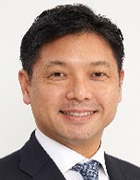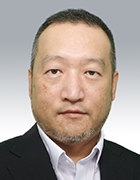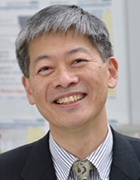* honorific titles are omitted
May 22 (Wed)
Realization of a Sustainable Space Environment and Entrepreneurship in the Reiwa Era

-
Nobu Okada
Founder and CEO, Astroscale Holdings
Since its inception in 2013, Nobu has grown Astroscale from a single person to an international group, established a global footprint in six countries, and raised over USD $383 million.
As a highly respected and influential figure in the space industry, Nobu holds several key positions, including member of the International Academy of Astronautics and Space Generation Advisory Council Advisory Board, and a Fellow of the Royal Aeronautical Society. Nobu was the International Astronautical Federation’s Vice President for Space Economy and Sponsorship until 2023 and co-chair of the World Economic Forum Council Global Future Council on Space Technologies until 2021, where he played a key role in developing the concept of a Space Sustainability Rating, a system designed to ensure long-term sustainability by encouraging responsible behavior among countries and companies participating in space.
Since founding Astroscale, Nobu has received numerous awards and accolades, including 2023 IAF's Excellence in Industry Award (SME), 2022 Prime Minister’s Award, 2022 TIME100 Most Influential Companies, 2021 Satellite Technology of the Year, 2020 SpaceNews Company Leader of the Year, 2020 UNESCO Netexplo Innovation Forum Grand Prix, Forbes JAPAN “Start-up of The Year 2019”, and World Economic Forum Technology Pioneer in 2017.
Prior to Astroscale, Nobu was an IT entrepreneur and strategy consultant, and had managed IT companies in Japan, China, India and Singapore. He led one company to a successful IPO. Before joining the IT industry, he worked for McKinsey & Company and the Japanese Government in the Ministry of Finance.
Nobu earned his bachelor’s degree in Agriculture from the University of Tokyo in 1995 and an MBA from the Krannert School of Business, Purdue University in 2001.
May 23 (Thu)
Trends in the Japanese automotive industry and expectations for the tool industry

-
Yu Yamamoto
Powertrain Manufacturing Base Technology Dept., Toyota Motor Corporation
- Mar 1997
- Graduated with a degree in Mechanical Engineering, Faculty of Engineering, Kyoto University
- Mar 1999
- Completed Graduate School of Engineering, Department of Mechanical Engineering, Kyoto University
- Apr 1999
- Joined Toyota Motor Corporation
- 1985-2006
- Assigned to Production Engineering Dept. 1
- 2006-2008
- Assigned to TMMNA (North American headquarters), Section Manager level (North American unit production preparation)
(Engaged in production preparation of North American unit systems) - 2008-2019
- Returned to Drivetrain Production Engineering Dept.
- 2019-2022
- Powertrain Management Dept. (Engaged in unit-based production planning)
- 2022-
- Powertrain Production Base Technology Dept.
(Engaged in unit production technology development and DX promotion) - To present
Introduction examples and latest trends of robot automation at processing sites using processing machine.

-
Masayuki Nakaya
Deputy General manager, Robot System Dept, Robot Division, Nachi-Fujikoshi Corp.
- 1995
- Joined Fujikoshi. Engaged in the design and sales of ultra-precision processing machines.
- 2003
- Assigned to the Robot Division Development Department.
Engaged in the development of robots for transporting glass substrates for LCDs and medium-sized 6-axis and 7-axis robots. - 2009
- Assigned to the Robot Automation System Engineering Department of the Robot Division. Engaged in proposing and building robot automation systems using in-house robots.
- 2012
- Seconded to Nachi-Fujikoshi China Corporation.
Provided technical support for the introduction of robots in China, Proposed robot automation concepts together with local staff. - 2020
- Returned as system manager.
Overseeing proposals and implementation of robot system inquiries from Japan and overseas.
May 24 (Fri)
Simulation Based Machining of Advanced Materials

-
Takashi Matsumura
Mechanical Engineering, Tokyo Denki University
Abstract
With progress in material development, advanced materials have recently been applied to control various functions in many manufacturing industries. In the automobile industry, new materials are used for electric vehicle; and in the aircraft industry, lightweight and high-strength materials are used to reduce the fuel efficiency. The medical industry requires biocompatible materials for surgical devices and implant components. The energy industry is using materials with high temperature strength and corrosion resistance. On the other hand, in recent information technology, the demand for brittle materials is increasing in optical components, ceramics, and semiconductor products. Although various methods have been applied to process these materials, cutting still plays a large role from the viewpoint of economic efficiency and controllability. When machining such materials, cutting in the inappropriate conditions will shorten the tool life and deteriorate the surface finish. Therefore, in terms of the tool wear and the surface finish, effective cutting techniques should be considered to promote high production rates with low cutting costs. In this talk, the concept of understanding and optimizing the cutting of advanced materials is introduce based on cutting simulation. First, the anisotropy in cutting of carbon fiber reinforced plastic (CFRP) and titanium alloy are discussed based on cutting simulations. Next, glass milling is introduced with its validation in the cutting simulation. Finally, some examples of whirling are shown with the simulation.
Biography
Professor Matsumura was graduated from Graduate School of Mechanical Engineering Science in Tokyo Institute of Technology in 1987. He worked as Research Associate in Department of Mechanical Engineering Science from 1987 to 1992 and received PhD. in 1992. He has been working as Professor in Department of Mechanical Engineering, Tokyo Denki University since 1992. He became the Director of Research Collaboration in 2006 and Director of the University in 2015. He was also a visiting scholar, Mechanical Engineering Department, Massachusetts Institute of Technology from 1997 to 2006; and a visiting professor, Mechanical Engineering Department, Mondoragon University supported by Ikerbasque Science in 2011. He served as Chairman of Steering Committee, Japan Society of Automobile Engineers; Director, Japan Society for Abrasive Technology; Associate Editor, Precision Engineering; Director, Japan Society for Precision Engineering; Chairman, Research Committee of Cutting Technology, Japan Society for Precision Engineering; Chairman, Manufacturing and machine tool division, Japan Society of Mechanical Engineers; General Director, Japan Society for Precision Engineering; Auditor, Japan Society for Precision Engineering; and Chairman, Research Committee RC295 in Japan Society of Mechanical Engineers. He is now serving as Vice President, Japan Society for Precision Engineering; Chairman, Manufacturing Engineering division, Japan Society of Automobile Engineers; Associate Editor, Journal of Advanced Mechanical Design, System, and Manufacturing, Japan Society of Mechanical Engineers; Director, The Japan Society for Die and Mould Technology; Associate Editor, Journal of Micro Nano Manufacturing. He has been studying in machining process modeling, micro/nano machining, tribology, surface engineering and intelligent manufacturing technology. He has published more than 200 papers and received 27 awards including 2 best paper awards in the International Institution for Micro-Manufacturing, the 4M Association and the International Forum on MicroManufacturing.
![WCTC2024. World Cutting Tool Conference Osaka,JAPAN [Date]May.21-24 2024 [Venue]Osaka International Convention Center](images/sub_visual.png)
